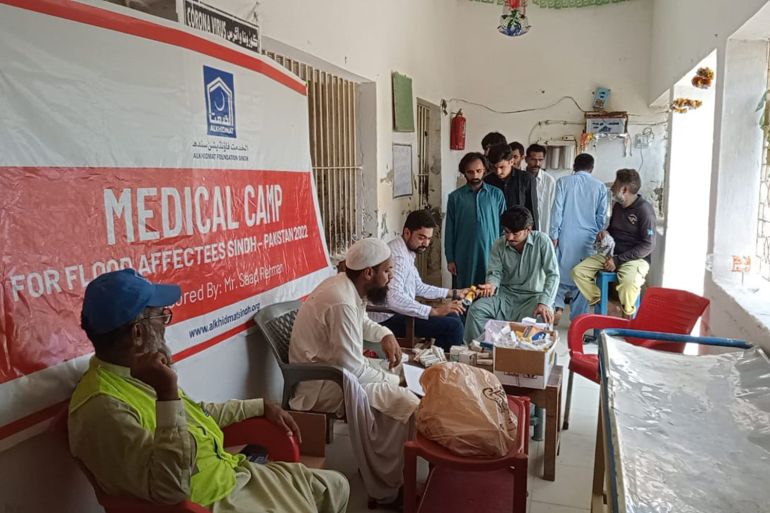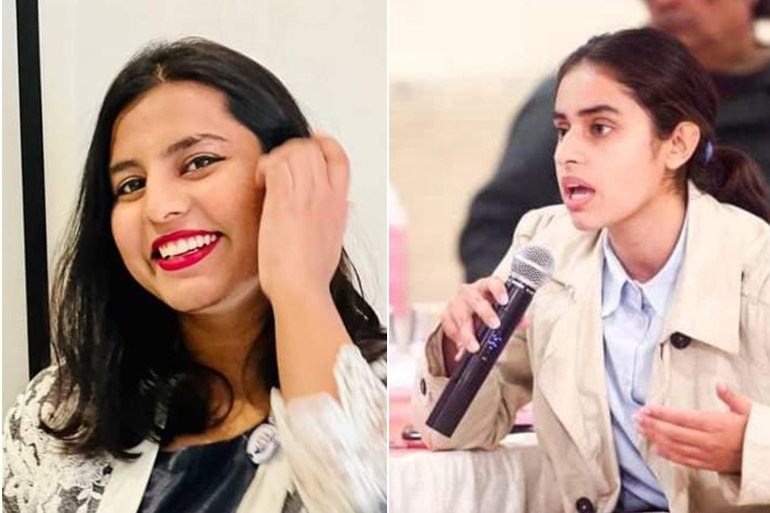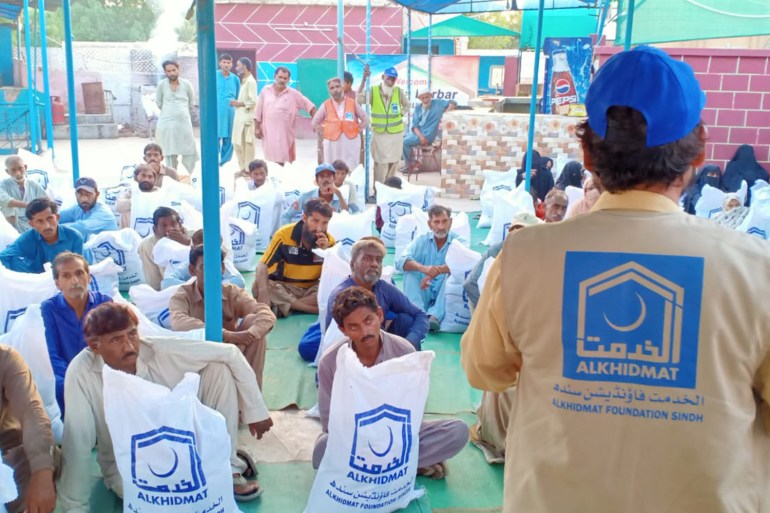How Pakistanis banded together to help flood victims
As record floods submerge the country, Pakistanis come together and launch charity campaigns to help the victims.

Islamabad, Pakistan – It was a distress call for help from a stranded friend in Pakistan’s southern Balochistan province that planted a seed in the mind of Anum Khalid, a 23-year-old student of architectural engineering at Multan city’s Bahauddin Zakariya University.
Khalid recalls her friend calling her in July and telling her of the devastation caused by the record floods in Lasbela, a city in Balochistan. During the conversation, she mentioned she was suffering from menstrual pain and had no means to manage it.
Keep reading
list of 4 itemsFlood-hit Pakistan bids to stop its largest lake from overflowing
Death toll in devastating Pakistan floods crosses 1,300 mark
How is extreme weather changing Pakistan?
The situation reminded Khalid of similar floods in 2010 – which killed more than 1,700 people and displaced tens of thousands – when she and many other women had suffered a similar predicament. The memory drove her into action.
“I left a message on all my social media accounts and my close contacts, seeking help for those women in need and to provide them hygiene relief. One person responded,” she told Al Jazeera over the telephone.
That person was Bushra Mahnoor, a 22-year-old undergraduate student of psychology at Lahore’s Punjab University.
“We had never met, in fact, we still have not met so far. We were just part of a people’s collective due to which we added each other on Facebook. But she was the one who responded back to my plea and said: ‘Let’s do it. Let’s help the women as much as we can,’” said Khalid.

The two students started Mahwari Justice (mahwari is the Urdu word for menstruation) in July and have raised more than $31,000 so far through gofundme, an online crowdfunding platform.
The money has helped them deliver more than 12,000 sanitary kits to flood-affected women in Balochistan, Sindh and Punjab provinces.
Maryam Jamali, a 19-year-old student in Balochistan’s capital Quetta, has collected more than $38,000 online so far for her Madat Balochistan (Help Balochistan) campaign. Her team has delivered 16,000 meals, 800 ration packs and more than 300 tents in various areas of the province.
“Where I am from, charity is an integral part of our lives. It is seen as being equal to a religious prayer. Growing up, my grandmother would feed anyone that would come our way, no matter what our financial circumstances were,” Jamali told Al Jazeera over the telephone.
Urgent appeals for relief
As Pakistan grapples with some of its worst floods ever, which have killed more than 1,300 people and displaced 33 million since June, the country’s civil society has banded together in a large number to help the affected people.
While the government estimates the flood-related damages at $10bn, independent analysts say the figure could be between $15bn and $20bn, and could even rise further in a country already straining under a financial crisis.
The Pakistani government has appealed to the global community for urgent relief. The United Nations also made an appeal to raise $160m to help the country facing “epochal rains and flooding”.
Muhammad Abdus Shakoor is the president of Al Khidmat Foundation, the charity wing of Pakistan’s prominent socio-religious organisation, the Jamaat-e-Islami. It is one of the country’s largest charities.
Shakoor told Al Jazeera that helping distressed people is “in the DNA of people”.
“It is not just during a crisis such as one we are facing right now. Even on normal days, Pakistanis make a lot of donations to charities. Ours is among the top charity donating nations. In times of stress and crisis, the middle class becomes even more active,” he said.
A Stanford University study in 2018 said Pakistan is one of the “most generous” countries and it contributes more than “1 percent of its GDP to charity”.
Al Khidmat Foundation officials say the group has already collected more than two billion rupees ($8.9m) since it started the funding drive in late July.

Muhammed Nawaz, an Al Khidmat Foundation official manning a relief camp in the capital Islamabad, said they were able to raise more than 4.5 million rupees ($20,000) within 10 days of setting up the camp.
“People come here regardless of their political and ideological leanings. They trust the work we have done over the years,” the 59-year-old told Al Jazeera.
However, many Pakistanis remain wary of donating to the government and most of their contributions have gone to non-governmental groups and individuals.
Jamali, the student from Quetta, says she is sceptical of official efforts and blames it on the “government’s incompetence and unreliability” during such calamities in the past.
“Being from Balochistan, I feel the government has long abandoned us. In fact, Pakistan has been abandoned by its government on many occasions,” she told Al Jazeera. “I think people have realised that their only hope is their own community.”
When asked to explain the people’s lack of trust in the government, Umair Javed, a professor of politics and sociology at Lahore University of Management Sciences, said people tend to donate to those who they believe will deliver the aid to the right people.
“In our religious system, the concept of Zakat exists, which involves not only knowing who you are giving it to but also making sure it is reaching the right people. It is a very important aspect of that particular type of giving,” he told Al Jazeera.
Zulfikar Ali Bhutto, the namesake grandson of a former Pakistani prime minister, along with his sister Fatima Bhutto and friend Menaal Munshey, is also collecting funds to help flood victims in Sindh province under their campaign, Indus Relief.
Bhutto, a visual artist and curator, says he has managed to raise more than $40,000 for the campaign as a private citizen, and that he wasn’t hampered by belonging to one of Pakistan’s most prominent political families.
“I have never been a part of the political party despite being from it. I think that has built trust in people. It also allows me a different and broader kind of access that is not limited to political affiliation or political loyalty,” he told Al Jazeera.
Bhutto credits social media for the uptick in people’s donations to help the flood victims.
“It has been very, very difficult to get through to the outside world unless you are in a major city. But social media helps raise awareness. It is how people learn and it has increased their knowledge of knowing how bad things are,” he said.
But Meena Gabeena, an activist running a collective to provide aid to the flood-hit people, feels many people still do not realise the scale of the unfolding disaster and why more aid needs to be collected.
“I feel the scale of this flood is not being realised by people who are themselves or whose relatives are not affected by this flood. We are all doing what we can because there is no other choice,” she told Al Jazeera.